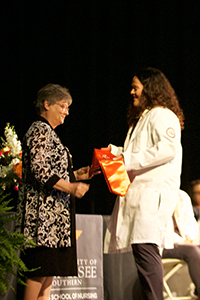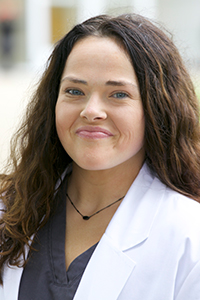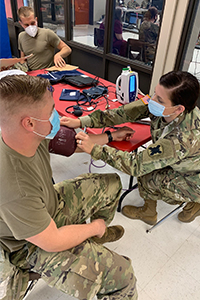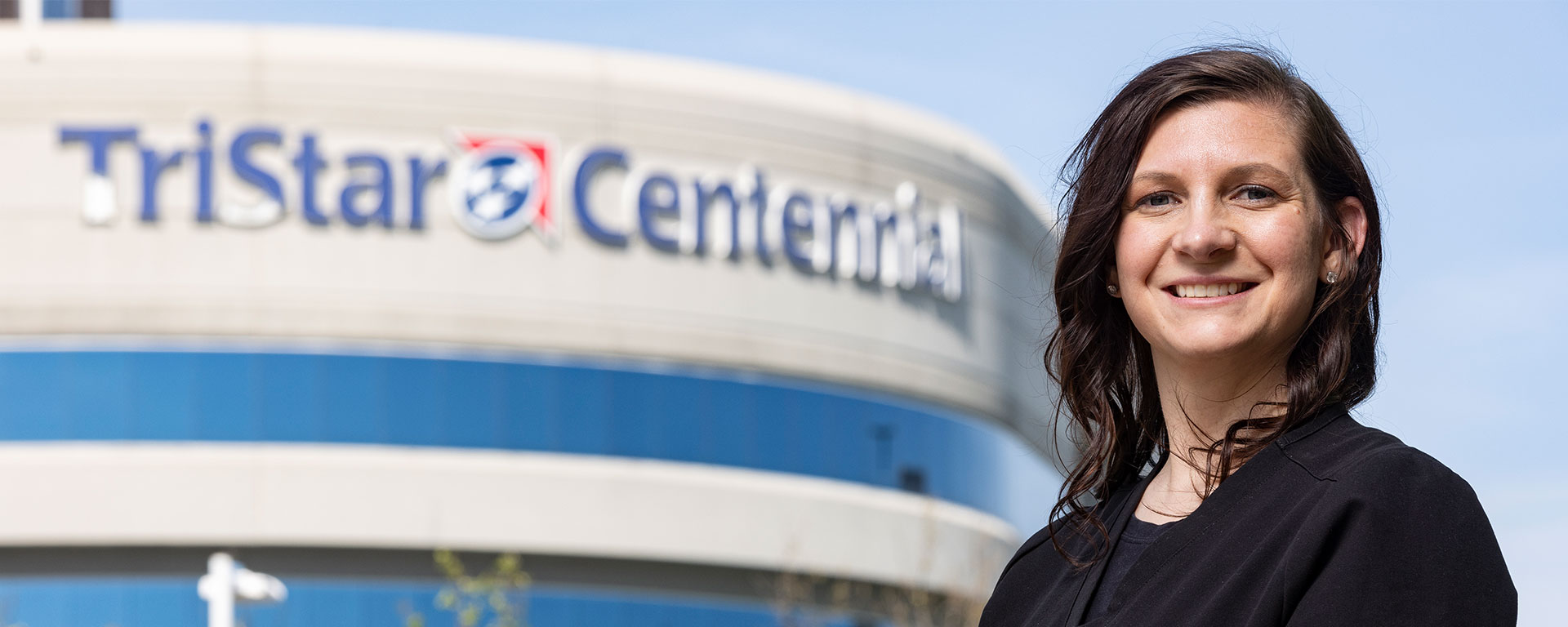The need for nursing was born on the battlefield, and today’s nurses and those learning to become nurses continue to serve important roles in the military.
To understand the history of their chosen field, UT Southern nursing students learn about how Florence Nightingale, who is considered the founder of modern nursing, used statistics to show why her methods of keeping the enlisted men clean and fed prevented disease and improved their outcomes, says Michelle Decker, chair of the UTS Travis School of Nursing and Health Sciences.

For two UT Southern alumnae, military service provided more training and injected a new sense of purpose into their nursing careers, especially as COVID-19 impacted them and many other nurses.
“They bring rich experiences that they share in the classroom and during clinicals,” Decker says of students with military backgrounds, recalling one of her early nursing instructors who had been a Mobile Army Surgical Hospital (MASH) nurse during Vietnam. “The military has rules, regulations and protocols, and you rarely step out from those. Medicine is the same way.”
Nursing Before Military
Ashtynn Barrett was in JROTC at Eagleville High School but decided to go to nursing school at Martin Methodist, which became UT Southern in 2021, after one of her teachers recommended the college. Her chance to join the military came later.
“I always knew I wanted to be a nurse. I wanted to go straight through to college or I thought I’d never get it done,” she says.
Barrett, the first college graduate in her family, was in Martin Methodist’s second class of nursing students and graduated in 2009. About eight years later, she was working in an ICU at a hospital in Murfreesboro when her husband’s job took the family to New Orleans. He served in the Tennessee Army National Guard and returned to Tennessee for his required drills. Barrett, after seeing “how much joy he got from it,” decided to join the Louisiana Army National Guard in 2019. Because she had a bachelor’s degree in nursing, Barrett got a direct commission as a first lieutenant and went to a direct commissioning course in Fort Sill, Oklahoma.
When the pandemic erupted in March 2020, Barrett was working as a medical officer in the state surgeon’s office for the Louisiana Guard to help ready soldiers for deployment to the Middle East. She tracked medical readiness, which means she collected information from reservists to make sure they had “green status” and were ready to deploy.
“I loved it. I met so many amazing people,” Barrett says. She recalls helping many people get ready for deployment by walking them through changes in medication, losing weight or using a CPAP machine to meet the Guard requirements.
“It was really a behind-the-scenes job, and it was cool to know I had a little part in helping them deploy,” she says. “I learned so much. Medical officer is a support role and a different aspect of the military that doesn’t get seen a lot.”

Barrett, who transferred to the Tennessee Army National Guard after moving back to her home state, says the work she did in Louisiana helped her prepare for her current job. Barrett works as a clinical nurse coordinator in the geriatric in-patient psychiatric hospital at Parthenon Pavilion Centennial Medical Center in Nashville. The hospital serves patients over 65 with mood and thought disorders such as bipolar and schizophrenia. Her job entails making a care plan for the patients with a treatment team that also includes a doctor, social worker and therapist. The team meets three times a week to talk about what’s going well or not and to plan for the patient’s eventual discharge.
“I had not done case management before working in the Guard. There I helped look at the big picture through medical records,” she says. Her previous nursing jobs were focused on getting patients well. “They come into the hospital with the flu, get well and go home,” she says. “I wasn’t looking at the situation before or after” the illness.
Military Saves Nursing
Samantha Vance had a nearly opposite experience from Barrett. Vance, who graduated from UT Southern in May, started nursing school at then-Martin Methodist in 2018, but when COVID-19 hit, she had a period of uncertainty about that career choice. Vance took a detour into the military, and that proved to be the jolt she needed to get back on course.
When Vance graduated from Portland High School, she had already become a certified nursing assistant (CNA) by taking classes at nearby Volunteer State Community College in Gallatin. Several colleges offered her scholarships to play soccer, but she chose Martin Methodist after meeting Decker during a visit. Decker talked about the nursing program, and “that made me want to come here more,” Vance recalls.
To say Vance had a busy schedule in college is quite an understatement. She spent the first two years completing the prerequisites for nursing and playing soccer during the week. Then she would leave school on Thursday afternoon and drive home to Portland, about two hours north, to work as a CNA at a long-term care facility. Vance was accepted into the nursing program in spring 2020 just as the pandemic began to be felt.
Her feelings about nursing began to dim as COVID-19 set in, and she started to feel burnout like many in the health care industry. “During COVID, it was totally different. People couldn’t come in and work, and we were covering floors just so patients had assistance,” she recalls. “It was an up-and-down battle. I was watching other nurses around me struggle, just trying to make it to the next day.”
By November 2021, Vance had had enough and decided to step back from school and join the Tennessee Army National Guard. She enlisted as a private first class and was sent to basic training in Oklahoma.

When she took the Armed Services Vocational Aptitude Battery test, it was no surprise it showed combat medic as the position in which Vance would best serve. Vance says serving in the Guard, which she still does, helped her realize she wanted to continue with nursing and specialize in emergency medicine. “I talked to my family and decided to relook at nursing after my training” in the Guard, she says. “The military helped me be more resilient and more disciplined.”
When Vance left college, she only had two semesters remaining, and then she missed the start of the fall 2022 semester by a week and a half. But UT Southern was more than happy to welcome her back.
“We all take different paths” to nursing and as a nurse, says Decker, who spent 31 years in the Lincoln County Health System before retiring and then joining the Martin Methodist faculty in 2014 and earning her doctor of nursing practice. “Nursing is wide open and diverse. You will always have a job.”
Ready to Be a Nurse
Both Barrett and Vance knew they wanted to be nurses from a young age.
Barrett wanted to work in the ER after watching TV shows depicting that area of medicine, but she fell in love with geriatrics. “There’s no adrenaline rush like those shows,” says Barrett, who also was drawn to science classes. “I love people. I love taking care of them, and I’ve always been really good at connecting with them, which is an aspect of nursing that can’t be taught.”
Vance’s inspiration came from a specific incident when she was 8. Her father was working at Vanderbilt University when he was attacked and suffered several major injuries such as a cracked skull that led to seizures. She watched the nurses take care of her father in the hospital.
“They were focused on my father, but they also made sure his 8-year-old daughter was OK. They brought me ice cream, and they would take me through the situation” and explain what was happening and the treatment he was receiving, she recalls. “That made me want to be one of them.”
Barrett and Vance have seen firsthand how difficult and how rewarding nursing can be. Barrett works with many patients who are homeless or from group homes and have no family or friends to advocate on their behalf. That’s where Barrett and the other members of the team help.
“We have a lot of fun with our patients,” she says. “But it can be really hard. The hardest part is to see people not getting the services they need because they don’t qualify.”
Being in the Guard helped Vance refocus on what made her want to become a nurse.
“It taught me about the care of the patient as a whole,” she says. When she was working through COVID, she realized “that wasn’t nursing. The military showed me I could do more with discipline.”



